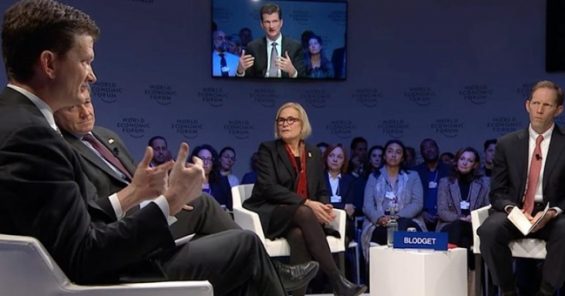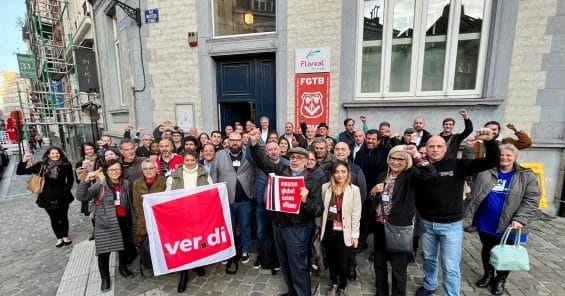Last week, UNI Global Unions’s General Secretary Christy Hoffman, together with eight other union leaders, brought a message that unions remain relevant and strong to the World Economic Forum in Davos.
The theme of the gathering was Globalization 4.0. and UNI’s central message was that Globalization 4.0 must be met with a reinvigorated social contract, or ‘Social Contract 4.0’, in order to succeed for workers and democracy. Davos coincided with the release of the report from the ILO Global Commission on the Future World of Work which also called for a re-invigorated social contract to address the issues of the new world of work.
For the unions, the key elements of the social contract include a living wage and social protection for all, the universal labour guarantee of fundamental rights for every worker whatever the form of work, an entitlement to life long-learning, strengthened collective bargaining and corporate accountability.
In its annual risk report, the WEF stressed the risk that global multilateral institutions are under threat by the nationalist and populous governments that have taken hold in Europe and the United States and this concern was echoes in many sessions. But as Hoffman responded to Richard Quest on CNN “So long as the labour share of wealth continues to decline, all of our democratic institutions are under threat.“ Hoffman told The Guardian’s Larry Elliott , that “Workers think that globalisation is for the elite, that Davos is for the elite. If we want a globalised economy, it can’t just be for corporations.”
For the past several years, a key topic at Davos has been rising inequality. This year was no different. Hoffman said in the interview with The Guardian, despite all the warm words there was little sign of action, “There is no sense of sacrifice. There needs to be a transfer of wealth from one set of pockets to another.” As Hoffman stressed, there is no way to diminish inequality without strong collective-bargaining coupled with new policies to tax wealth. In an interview with Der Spiegel, Hoffman said, “We see digitalization driving the wealth of people like Amazon founder Jeff Bezos to enormous levels, whereas there was no wage growth in western Europe in 2017 in real terms.”
In her interviews with media at Davos, Hoffman stressed the important role of bargaining to ensure a just transition to the new world of work, “We can bargain about the implementation of new technology, about the unrealistic scheduling accelerated by digital technology, about excessive surveillance and many more issues. If workers don’t have a voice they will resist this technology. We are not afraid of new technology but it must be implemented in an atmosphere of security and fairness. Bargaining is central in the mix.”
Upskilling was another headline topic in Davos. Across all industries, CEOs expressed their commitment to upskill their current workforce in the use of digital technologies. There was a widespread sense of optimism that the jobs in the future will not disappear but instead there will be a net gain in the numbers of jobs created. At the same time, there was recognition that in this transition some workers will be displaced. In order for these workers to have a just transition into a new type of occupation, the governments will need to step up, ideally through new tri-partite systems, Hoffman said during one of her Davos panels, which also included the Director-General of the ILO, Guy Ryder.
The General Secretary of the ITUC, Sharan Burrow, summed up the Davos experience for the group of union leaders when she tweeted that the business community was split into two camps, on the one hand, those who want to work with unions to change the rules of the game to save the planet and reduce inequality through a new social contract, and on the other hand, those who only care about profit, not people. Hoffman reiterated UNI’s intention to continue to work with those companies who show responsibility to their workforce, such as UniCredit with whom UNI signed a global agreement last week, and to hold to account those, such as Amazon, who do not.
For more media coverage from Davos, featuring UNI GS see here: https://rlsd.co/p/l_FBOQ


